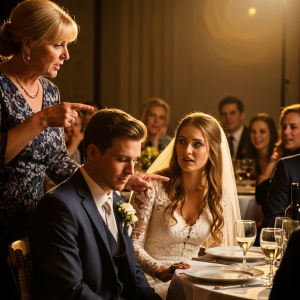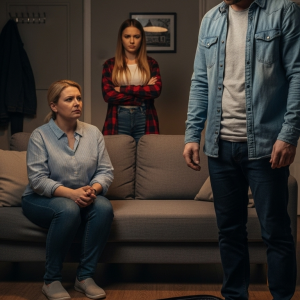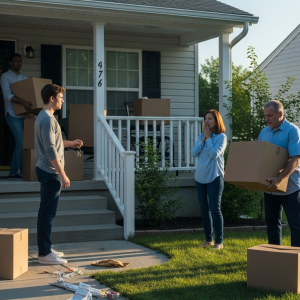My father was dying. For years, his kidneys had been failing, but now, at the end, he needed dialysis twice a week. He was weak, lonely since my mother’s passing, and I was his only son. I made a promise to myself that I would be the one to take him. Every Saturday and Wednesday, I would leave my life behind to sit with him, to drive him, to simply be there. It was the least I could do. My boss understood. My wife, Avil, did not.
To Avil, my father was a lost cause. Years ago, he had wanted me to take over his successful merchandising business. I, however, was passionate about technology and software development. I chose my own path, built my own career, and bought my own house. My father, hurt that I wouldn’t carry on his legacy, furiously declared he was cutting me out of his will and giving his fortune to charity. I accepted his decision. Our relationship soured, but after my mother died, we slowly began to reconnect.
Avil never forgave him. She saw my father not as a person, but as a failed investment. “There’s no point wasting your time on him,” she would sneer. “Whatever you do, he’s never going to be impressed. He’s already disowned you.”
My life became a battleground fought on two fronts. At my father’s side, I was a son trying to offer comfort. At home, I was a husband enduring a siege.
Every Saturday became a new battlefield. If I had to take Dad to dialysis, she would suddenly decide to host a party. If I had to leave work early on a Wednesday, she would conveniently “forget” she had plans, leaving me to juggle the kids, dinner, and my pending work after a draining day. The drive to the dialysis center, once a time for quiet conversation with my dad, became a frantic race against the clock, all to return home to her sarcasm and tantrums.
The arguments grew uglier. She called my father “greedy.” I finally snapped back. “Your parents have nothing to give, so why do you visit them?”
She exploded. “My parents supported me! They aren’t like your father who disowned you for following your dream!”
It became our routine. The fights were no longer private; she would yell at me in front of our children, badmouthing my father, poisoning their minds against their own grandfather. I grew numb to it, ignoring her as best I could. I chose to spend what precious little time I had with my father peacefully, driving slowly, helping him from the car to his bed, savoring the moments, regardless of the storm awaiting me at home.
My calm defiance only enraged her further. One day, she delivered her ultimatum.
“You need to choose, Alex,” she said, her voice devoid of emotion. “It’s either him or me. The dying old man, or the woman who is supposed to be your future.”
The choice was so monstrously simple it was almost a relief. “Then I choose my father,” I said quietly.
She packed her bags and left that night. A week later, she sent me divorce papers. I signed them without hesitation. To my surprise, she didn’t ask for custody of the children. Her mother later called, screaming that I should have “acted like a man” and begged Avil to come back. I laughed. She wanted a divorce, and I complied. She even abandoned her own children. “Avil is still young,” her mother had said. “She doesn’t need the baggage of children on her shoulders.” Fine by me. I was glad to have my kids.
After the divorce, I made a decision that changed everything. I moved, with my children, into my father’s house. It was the best move I ever made. My father, frail as he was, found new life in the company of his grandchildren. His full-time caregiver helped look after my kids while I worked. For the first time in years, our little broken family felt whole. Seeing my dad playing and laughing with my children was a gift.
Avil, I heard, was furious. She had divorced me to make my life miserable, thinking I would crumble under the weight of single fatherhood. Instead, I was thriving.
Sadly, a few months later, my father passed away in his sleep. He went to bed happy after a day with his grandchildren and never woke up. His doctor said his final months, filled with the joy of family, had likely extended his life. The loss was immense, but I was grateful for the peaceful end he was granted.
A week after the funeral, my father’s lawyer called, asking me to come to his office for the reading of the will.
“It’s not necessary,” I told him. “I know the contents. Everything goes to the trust. Just tell me if I need to vacate the house.”
The lawyer chuckled. “Just come over, son.”
When I arrived, the members of the trust were already there. The lawyer began to read. I prepared myself for the final confirmation of my disinheritance. But the words I heard were not what I expected.
The business. The house. The investments. The wealth. It was all for me. I was his sole heir.
A sob I hadn’t realized I was holding back escaped my lips. The truth of it—that my father had never abandoned me, not really—was a weight and a relief so immense it brought me to my knees right there in that quiet, wood-paneled office. I thought he had changed the will recently, a reward for my care.
“He never changed the will, Alex,” the lawyer said gently. “He never would have. He threatened to disown you because he was hurt, but he told me something else in private. He said he was prouder of you for having the courage to follow your passion, even at the cost of generational wealth, than if you had simply taken over the business. He was so incredibly proud of you.”
I cried, not for the money, but for the love I had misunderstood for so long. The company was his baby, and now it was mine. I decided then and there to quit my job and take over his business, to build his legacy to the heights he always dreamed of. It was my turn to pay him back.
News of my multi-million dollar inheritance traveled fast. Long-lost relatives and friends suddenly appeared. But the most surprising visitor was Avil.
A month after my father’s death, she showed up at the door of my father’s house, her parents in tow. They entered sobbing, claiming they hadn’t heard of his passing or they would have attended the funeral. Avil hugged the children, crying about how much she missed them.
“If you missed them so much,” I asked, my voice flat, “why haven’t you visited in the last eight months?”
“I went to our old house, but it was locked!” she lied.
“And you weren’t worried? You didn’t think to contact me to see if your children were okay?”
She had no answer. Her parents interjected, suggesting that now that my father was gone, the children needed a mother, and it was time for us to reconcile. I laughed in their faces.
Avil pleaded, holding my hands, telling me she loved me.
I pulled my hands away. “You don’t love me, Avil. You love the number in my bank account. You and your greedy parents are not here for our family; you’re here for my father’s money.” I didn’t regret using those words. She had called my father greedy during our divorce; there was no way I was letting her touch a penny of his hard-earned wealth.
Her demeanor shifted instantly from pleading to venomous. “Until now, I was pleading because I love you,” she hissed. “But now, I will take what is rightfully mine. I want half of your wealth.”
“You can try,” I told her. “I will destroy you in court before I give you a penny.”
She stormed off, screaming abuses. My lawyer later assured me her chances were slim to none. The divorce was settled a year before my inheritance.
I’ve taken his advice to heart. I supervise any meeting she has with the children, lest she try to manipulate them. I have taken over my father’s company, which gives me the flexibility to be the father my children deserve. I am taking them on a vacation to the Bahamas. They deserve a lavish trip, and I can finally afford it, not just with money, but with time.
As for Avil, I hear she is busy, knocking on the door of every lawyer in the city. Let her try. My father’s true will was not about money; it was about the legacy of love and pride he left me. And that is an inheritance she can never touch.




